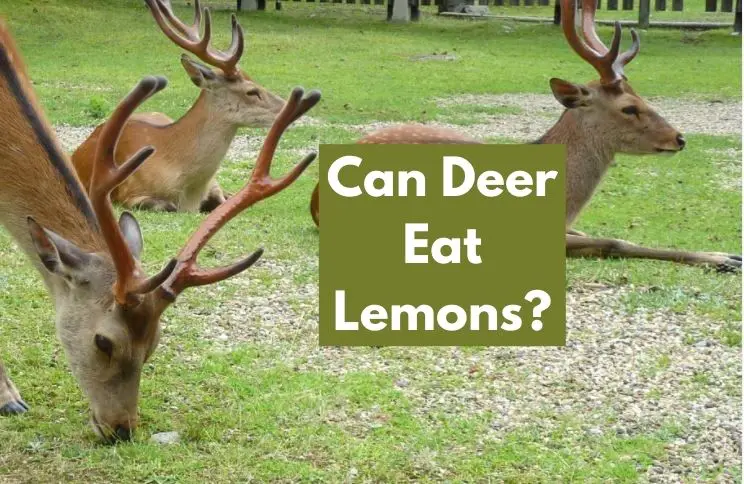There are a lot of myths out there about what deer do and do not eat, especially when it comes to everyday foods like fruit. One common question is: can deer eat lemons?
Yes, deer can eat lemons, although lemons are not their favorite. Deer will eat lemons and lemon trees if they are hungry enough.
Considering that a single deer can eat up to ten pounds of plants each day, you can see how deer eating lemons can do some serious damage to these trees!
Why Do Deer Eat Lemons?
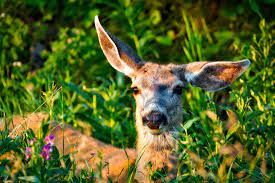
As we covered, deer will eat the leaves of lemons mostly in fall as compared to the fruits in summer.
Deer have been known to eat the entire lemon, along with the leaves, buds, blooms, and limbs of lemon trees.
They’ll even eat the tops and limb tips of young lemon tree saplings in the spring.
But why do they do this?
Deer like sweet foods and plants that are well-watered and fertilized, and lemons check every box.
Deer can do some serious damage to a large number of lemon trees in a single sitting if they’re hungry enough!
This was confirmed in a 1999 study on deer plant-eating habits by Cornell University.
Plants like lemons contain water, sugar, carbohydrates, and nutrients, which makes them an ideal food source for deer.
And don’t think that newer lemon trees are safe either: deer actually prefer new growth because they’re more tender.
While it’s true that young lemon trees have thorns at first, they’re simply no match for deer.
Additionally, deer will consume a wide variety of foods like lemons based on opportunity.
They’re planted in the ground and grow easily in coastal areas, so they’re easy for deer to access.
If you’re not convinced, leave some lemons out or plant some, and wait to see what happens!
Do Deer Eat Meyer Lemon Trees?
We often get gardeners or homeowners asking: do deer eat Meyer lemon trees, or another type of specific lemon tree they have.
Yes, deer will eat any type of lemon tree, including Meyer lemon trees, Eureka lemon trees, and Ponderosa lemon trees.
Deer will eat nearly all parts of a lemon tree including the leaves, tips, buds, and fruit.
How Do I Keep Deer From Eating My Lemon Tree?
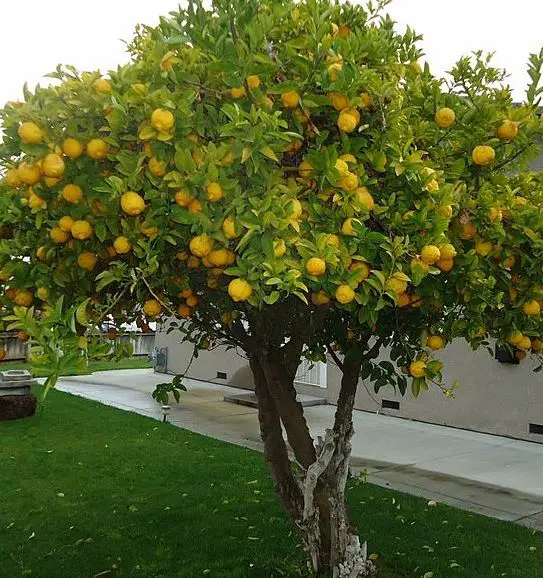
Some farmers and hunters encourage deer to browse their lemons as part of food plots or other attractants.
If you’re in the other camp and want to protect your lemons from deer, we’ve got some great options for you.
There are a few things to keep in mind when you’re protecting lemon trees from hungry deer: their habits, your scent, repellent options, and when you plant them.
Deer will eat nearly anything if they’re hungry enough, so your main goal is making your garden as least inviting to deer as possible.
Check out our guide on how to keep deer from eating plants where we cover 25 quick and easy tips for keeping hungry deer out of your garden.
Will Lemon Trees Grow Back After Deer Eat Them?
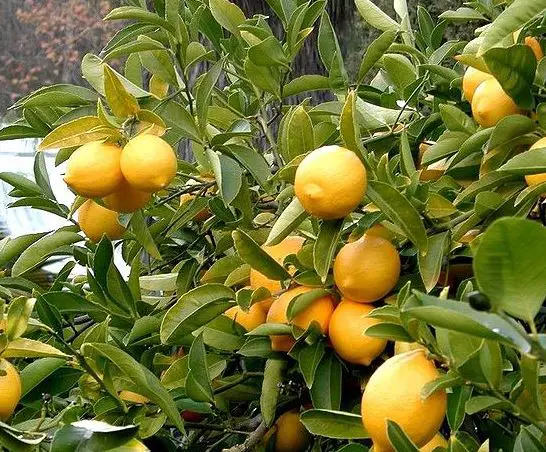
Fortunately, most lemon trees can heal after a good bit of deer damage.
Prune back any damaged limbs, and take preventative measures to keep the deer from damaging them in the future.
You can give it a weak fertilizer and continue regular care until the lemon tree is back to good health.
Are Lemons Good For Deer?
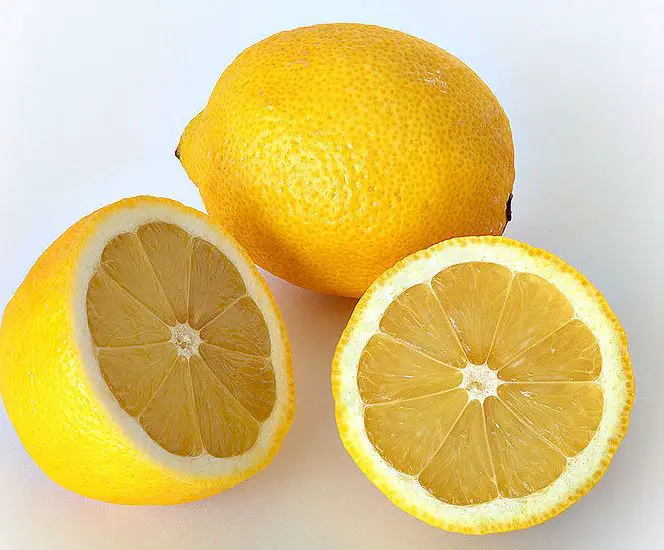
Lemons have small amounts of fiber and a good amount of sweet carbohydrates, so they attract deer easily.
In addition to being a great source of energy, deer eating lemons provide them with the following vitamins and minerals:
- Vitamin B6
- Vitamin C
- Potassium
These vitamins and minerals provide deer with many benefits.
For example, vitamin C will help protect deer against scurvy, and vitamin assists in deer immune system function.
Potassium is great for deer because it helps maintain a good pH balance and aid in proper digestion.
Fat-Soluble Vitamins in Lemons For Deer
Vitamins A and calcium are fat-soluble, so they can be stored in the deer’s fat and liver to be used later as needed.
This means that vitamin A content from deer-eating lemons can be “stored up” for later use, which is highly beneficial.
Water-Soluble Vitamins In Lemons For Deer
Vitamin C, B Vitamins, phosphorus, zinc, and potassium are all water-soluble, which means they cannot be stored, so they must be replaced continually.
So a deer that eats lemons for the vitamin C content must continue to consume foods that contain these necessary vitamins to stay healthy.
How To Feed Lemons To Deer
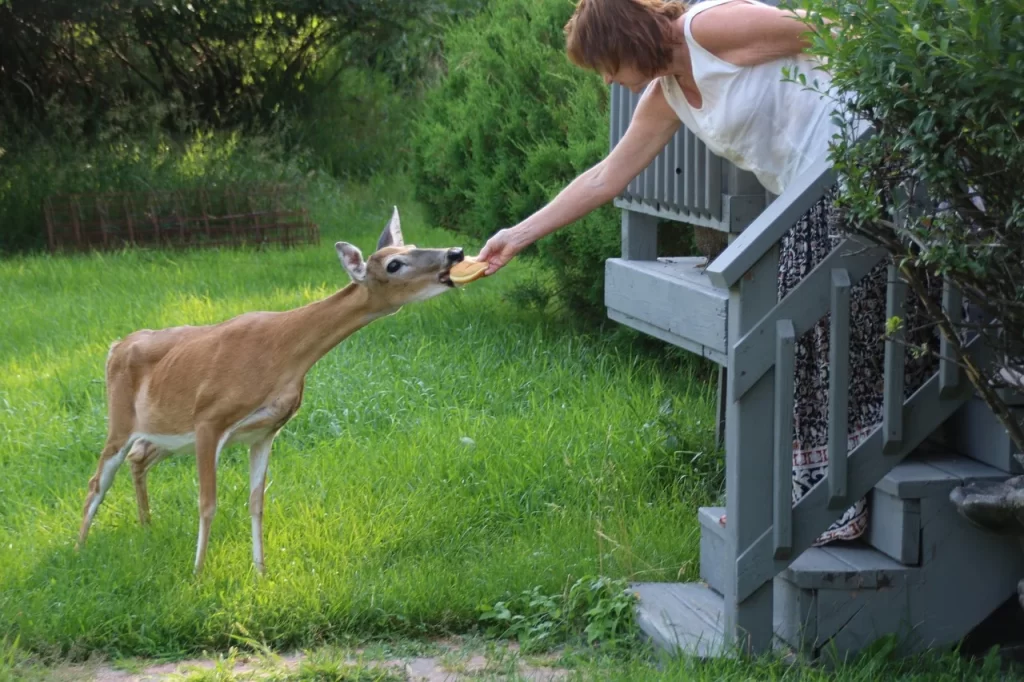
Most people who ask if deer like lemons are concerned with keeping deer away from them.
If you are trying to feed deer lemons in your backyard and attract them, then this next section of our guide is for you.
There are a few things to keep in mind when feeding deer lemons: the size of the portion, your scent, and how many deer you’re feeding.
Make sure to place the lemons on the ground where they’re visible and can be easily reached by deer.
If you’ve got a hickory tree, the nuts will naturally fall on the ground and the deer will eat them, usually after all other food resources have been depleted.
If deer are not normally around your area in winter, don’t feed them leading up to winter as they will not migrate where and when they should.
This will lead to the deer relying on you as their food source and can result in starvation.
Should I Cut Lemons For Deer To Eat?
Deer like eating the flesh and seeds of lemons, but the bitter peel can be tough for them to get past.
Cut up the lemon into 1-2” pieces if you want to feed lemons to deer.
Don’t Leave Your Scent On Deer Food
Deer have a keen sense of smell that allows them to smell human scent farther than bloodhounds can, and can smell up to six different scents at once.
Deer won’t eat food like lemons if they have a strong human scent on them, so you should take care to minimize your trace.
You can do this by rinsing the lemons and also washing your hands with antimicrobial soap.
Alternatively, you can put a few drops of apple cider vinegar on your hands when handling the food you’ll be giving to the deer.
Another easy option is to use gloves when handling lemons for deer to eat.
Consider The Amount Of Deer You’re Feeding
If you have lots of deer in your area, think twice about putting out food continuously for them.
If you bring deer together at the same feeding site, it can increase their risk of contracting the chronic wasting disease or other communicable diseases from each other.
Do Deer Eat Lemons? Wrapping Things Up
So, do deer eat lemons?
The answer is yes!
Deer will eat lemons and lemon trees if they’re hungry enough.
They’ll happily eat the lemon, lemon tree leaves, soft limbs, tips, and buds if they’re able to.
Fortunately, there are many steps you can take to protect your lemon trees from deer which we’ve outlined above in this guide.
Have any observations to add to the discussion? Be sure to let us know in the comments below.
Check our our other helpful wildlife guides while you’re here:

